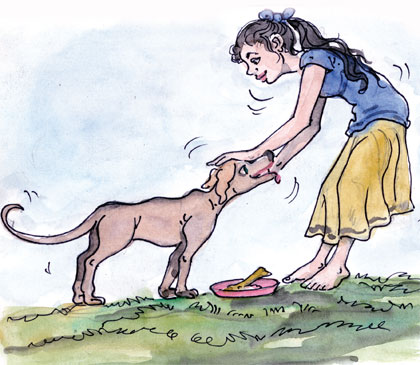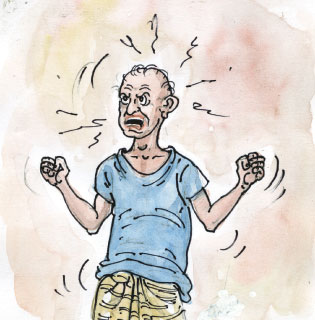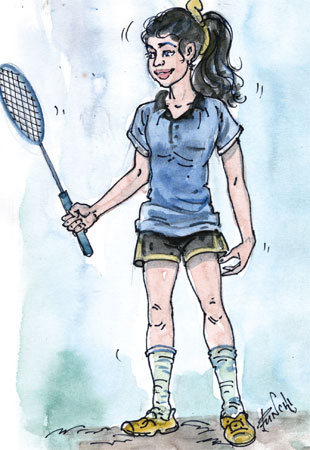|

by R. S. Karunaratne
Talking in general without ‘the’
|

Most women love dogs. |
We do not normally use ‘the’ to talk about people or things in
general.
Women are innocent and beautiful.
Eva likes music.
Too much sugar will make you ill.
Most women love dogs.
Most men like horses.
Artists paint beautiful pictures.
Engineers build bridges.
Cats like milk.
Dogs don’t eat grass.
Cows feed on grass.
Photographers take wedding photographs.
Violinists play music.
Shopkeepers sell various household items.
Teachers teach various subjects.
Old people often lose their temper.
Women are good drivers.
Clothes are expensive in Australia.
Flowers are nature’s beautiful creations.
Life is a struggle.
We have to buy food.
Water is scarce in Moneragala.
Men are better drivers than women.
Money is not everything.
Women understand men.
Men don’t understand women.
Women buy anything that is cheap.
Men buy only what they really need.
We use ‘the’ to talk about particular people or things.
The people in my neighbourhood are very friendly.
The music I hear is too loud for me.
Can you pass the sugar?
The Smiths are very rich.
Why are the dogs barking?
The cats in my house don’t catch mice.
|

Old people often lose their temper. |
Some people like talking to the old people at the home for the aged.
The books I ordered are very expensive.
Where shall I affix the stamps?
The flowers you brought are still fresh.
The life I lead is hard.
I don’t understand the words in this poem.
The food at this restaurant is very tasty.
The water is boiling. Shall we make some tea?
Why are the doors kept open?
[Activity]
Underline the correct word or words and check your answers with the key.
1. I like cricket / the cricket.
2. I don’t like chess / the chess.
3. I love poetry / the poetry.
4. I enjoy music / the music.
5. I am good at the history / history.
6. I am not interested in the politics / politics.
7. Most people are interested in learning the English / English.
8. I prefer football / the football to the cricket / cricket.
9. Most girls prefer the netball / netball to the swimming / swimming.
10. I think archaeology / the archaeology is a boring subject.
Key:
1. cricket 2. chess 3.poetry 4. music 5. history 6. politics 7.
English 8. football, cricket 9. netball, swimming 10. archaeology
Match words and meanings
Here’s an exciting way to enrich your vocabulary. Match the words in
column A with their meanings in column B and check your answers with the
key. The first one has been done for you.
Column A:
N 1. correspond
... 2. corresponding
... 3. corridor
... 4. corroborate
... 5. cortege
... 6. cortex
... 7. cosignatory
... 8. cosmic
... 9. costly
... 10. cosy
... 11. cot
... 12. coterminous
... 13. cottage
... 14. couch
... 15. counsel
... 16. counsellor
... 17. countdown
... 18. countenance
... 19. counterfeit
... 20. counterfoil
... 21. countess
... 22. countless
... 23. countrified
... 24. countryman
... 25. countrywide
Column B:
A. the wife of a count
B. the part of a ticket
C. made to look like the original thing
D. the appearance of someone’s face
E. to give advice
F. a type of high bed
G. a small house
H. a small bed for a baby
I. expensive
J. one of two or more people who sign
K. a slowly moving line of people at a funeral
L. a long passage in a building
M. similar
N. to match
O. involving all parts of a country
P. a person from your own country
Q. belonging to the countryside
R. very many
S. the act of counting backwards to zero
T. someone trained to give advice
U. having a shared border
V. comfortable and pleasant
W. relating to the universe
X. the outer layer of the brain
Y. to add proof to an account
-----------------------
Key:
2. M 3. L 4. Y 5. K 6. X 7. J 8. W 9. I 10. V 11. H 12. U 13. G 14. F
15. E 16. T 17. S 18. D 19. C 20. B 21. A 22. R 23. Q 24. P 25. O
Pair nouns and group nouns
We use a pair noun for a thing made of two parts. A pair noun is
plural and takes a plural verb.
|

She's wearing tennis shorts. |
Binoculars: a pair of tubes with glass at either end that you look
through to see things far away.
I want to buy a pair of binoculars.
Glasses: a pair of spectacles
Did you see my glasses?
My jeans need washing.
A pair of underpants will cost you Rs 500.
Pyjamas: soft loose clothing which is worn in bed and consists of
trousers and a type of shirt.
You need a new pair of pyjamas.
Scissors: a device used for cutting materials such as paper, cloth and
hair.
Do you have a pair of scissors?
Could you pass me the scissors?
Can you pass me those scissors?
Shorts: trousers that end above the knee or reach the knee.
She's wearing tennis shorts.
I'll put on a pair of shorts.
Tights: a piece of clothing made of thin stretchy material which covers
the legs and lower parts of the body below the waist.
I'm going to buy a new pair of tights.
Trousers: a piece of clothing that covers the lower part of the body
from the waist to the feet.
My son needs a new pair of trousers.
Now you have to wear trousers.
Group nouns
A group noun usually takes a singular or a plural verb.
The cricket team is playing well.
The cricket team are playing well.
The government is in crisis.
The government are in crisis.
The choice depends on whether we see the group as a whole or as
individual people.
The family is very rich.
The family are happy with what they have.
The orchestra consists of 20 musicians.
The orchestra haven't decided what to play.
The committee has made a unanimous decision.
The committee are divided in their decision.
My firm was founded in 1960.
My firm are wonderful. They are very supportive.
When a group noun is used with a singular determiner (a, an, each,
every, this or that) we use a singular verb.
A team which is full of enthusiasm has a better chance of winning.
Many singular qualifying expressions can be used with plural nouns
and pronouns. They take plural verbs.
A number of people have come to see the new minister.
A group of scientists are trying to find a cure for cancer.
A couple of friends are planning to visit Malaysia.
A lot of social problems are caused by drug addicts.
The majority of criminals are violent.
Half of his students don't understand the difference between ‘its’ and
‘it's.’
Police, people and cattle have a plural meaning and take a plural
verb.
The police have arrested the suspect.
The people are protesting against the new tax.
The cattle are grazing.
Quiz on idioms
An idiom is a special kind of phrase. It is a group of words which
have a different meaning when used together from the one it would have
if the meaning of each word were taken individually. Tick the meaning of
the idioms in bold type and check your answers with the key.
1. If someone says that you are right on the button ...
(a) you've guessed correctly about something
(b) you've failed to guess correctly about something
(c) you are keeping your hand on the button
2. If you refer to the whole caboodle ...
(a) you refer yourself
(b) you refer to a part of something
(c) you refer to the whole of something
3. If you tell someone to cut the cackle ...
(a) you tell them to go away
(b) you tell them to stop talking nonsense
(c) you tell them to stop joking
4. If you rattle someone's cage ...
(a) you say something that annoys them
(b) you say something that pleases them
(c) you say something that is not true
5. If someone raises Cain ...
(a) they get very upset about something
(b) they get very angry about something
(c) they become very amused about something
6. If someone takes the cake ...
(a) you express nothing about their behaviour
(b) you express satisfaction at their behaviour
(c) you express surprise at their extreme behaviour
7. If someone kills the fattest calf ...
(a) they celebrate to welcome back a person who has been away for a long
time
(b) they kill the fattest calf for a special occasion
(c) they take a final decision
8. If something was a close call ...
(a) someone passed an examination with great difficulty
(b) someone won a big lottery prize
(c) someone very nearly had an accident
9. If someone is a camp follower ...
(a) they follow a person or group of people they don't like
(b) they follow a person or a group of people the admire
(c) they follow a person or a group of people they don't know
10. If someone pitches camp ...
(a) they temporarily settle somewhere
(b) they permanently settle somewhere
(c) they put up a camp
Key: 1. (a) 2. (c) 3. (b) 4. (a) 5. (b) 6. (c) 7. (a) 8. (c) 9. (b)
10. (a) |

